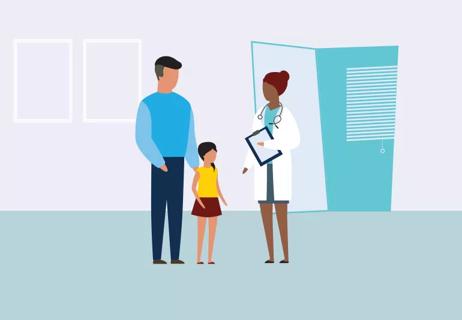The short answer from a pediatric allergist/immunologist

A: Typically, with a classic food allergy, symptoms begin within 30 to 60 minutes of eating a particular food. Sometimes it can be hours later, but that’s very rare.
Advertisement
Cleveland Clinic is a non-profit academic medical center. Advertising on our site helps support our mission. We do not endorse non-Cleveland Clinic products or services. Policy
There are many types of adverse reactions to foods, but when we talk about food “allergy,” we’re usually referring to immediate allergic reactions caused by an allergy antibody, with potential for anaphylaxis. Reactions vary from person to person, but allergic reaction symptoms can include:
We get very concerned with breathing trouble or a change in a child’s voice — those can indicate more serious reactions. It’s very rare, but potentially a food allergy reaction could be fatal.
In the pediatric age group, the most common allergies are to milk and eggs. Peanuts and tree nuts are also common allergy triggers, as well as soy, wheat, fish and shellfish.
Sesame is an emerging concern in the United States, and the Food and Drug Administration (FDA) recently added this as a required allergen on packaged foods, similar to what you see in the grocery store on labels for milk and eggs.
Parents often tell me how scared they were the first time their child had a reaction, and that’s very understandable. If you have reason to suspect your child is having a serious food allergy reaction, take a deep breath. You know your child better than anyone else in the world. If you are really, truly worried, then get them to an emergency room. Call EMS (emergency medical services) and tell them that you have a child who is potentially having a food allergy reaction so that they send the right kind of emergency medical services to your home. Or, if you live within reasonable driving distance to a hospital, just get them there quickly yourself.
Advertisement
Very mild reactions such as a few hives can be sometimes treated with antihistamines like Zyrtec®, which can help a child feel better as the reaction goes away. But for anything more serious, we recommend epinephrine and treatment with emergency medical services.
If your child does indeed have a food allergy, make sure you’re taking the proper precautions for them at school and on play dates as well.
— Pediatric allergist/immunologist Jaclyn Bjelac, MD.
Advertisement
Learn more about our editorial process.
Advertisement

New treatment offers hope for outgrowing the life-threatening condition

More than 90% of allergic reactions can be linked to these foods

Be prepared, read up, team up, trust your gut and advocate

It’s likely a short-term sensitivity (not an allergy) to acidic foods

Try foods first to see if your child has a reaction

Symptoms can be similar, but affect your body in distinct ways

Shellfish is the top food allergen in adults

Babies are born with very little of this vitamin, which plays a critical role in the blood clotting process

Wearing a scarf, adjusting your outdoor activities and following your asthma treatment plan can help limit breathing problems

Your diet in the weeks, days and hours ahead of your race can power you to the finish line

When someone guilt trips you, they’re using emotionally manipulative behavior to try to get you to act a certain way